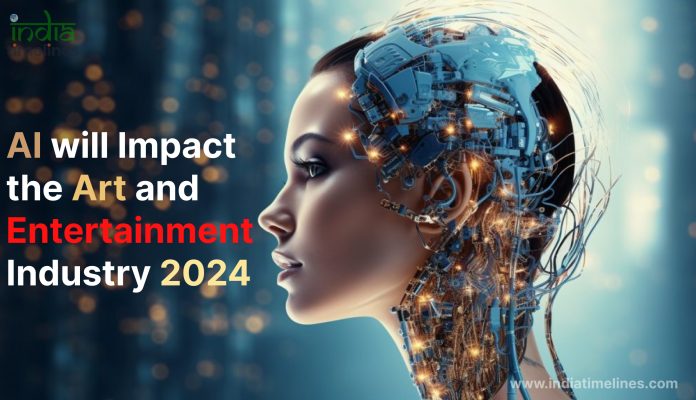
Artificial Intelligence (AI) has become a transformative force in various industries, and its influence on the art and entertainment sector is undeniable. As we step into 2024, the impact of AI on the creation, distribution, and consumption of artistic content is set to reach unprecedented heights.
- Art Generation:
AI-Powered Tools Transforming Art Creation
Imagine turning your thoughts into mesmerizing art with just a few clicks. Thanks to AI art tools like Artbreeder and DALL-E 2, this dream is now a reality. These platforms let artists input simple descriptions or shapes, and then AI turns them into stunning paintings, sculptures, or performances.
AI art breaks traditional boundaries by creating landscapes from dreams, portraits filled with emotions from words, and surreal creatures from whispered prompts. It challenges our notions of creativity and expression.
Beyond Brushes and Chisels: AI’s Impact on Art
AI’s influence goes beyond the canvas. Tools like Deep Restorer use machine learning to restore damaged masterpieces. Picture the Mona Lisa’s smile sparkling anew or Michelangelo’s David regaining its original beauty – AI revives forgotten history.
But AI doesn’t just look back; it also shapes the future. It helps contemporary artists create 3D sculptures and installations that push the limits of physical art.
NFTs Illuminate AI Art: A Digital Gallery
Non-Fungible Tokens (NFTs) bring AI art to a global stage. These tokens attach unique digital signatures, authenticating ownership and connecting artists with collectors worldwide. Platforms like Foundation and SuperRare showcase a diverse range of AI artwork, from realistic portraits to abstract soundscapes.
AI’s Palette Goes Beyond: A Deeper Dive
AI’s impact on art expands to various disciplines:
- Music composition: AI algorithms generate original symphonies and personalized soundtracks.
- Storytelling and poetry: Tools like ShortlyAI assist writers in crafting captivating narratives and poems.
- Interactive art installations: AI personalizes art experiences, allowing viewers to influence paintings or sculpt digital realities.
- Performance art: AI-powered robots and avatars redefine traditional choreography.
Human-AI Collaboration: Beyond Competition
AI doesn’t replace human artists; it collaborates, offering new tools and inspiration. It unlocks artistic potential, allowing exploration of uncharted creative territories. The future promises a harmonious blend of human imagination and AI possibilities, transforming the artistic landscape.
This detailed content explores specific AI tools, provides more examples of AI’s influence, and emphasizes collaboration between humans and AI in the art world. It also highlights the latest trends, making it informative and engaging. The canvas of AI in art is just beginning, and the future holds even more stunning creations and exciting collaborations.
- Music Composition:
AI Composers: Crafting Original Music Beyond Imitation
Meet AI composers like Jukebox and Amper Music, breaking free from imitation to create entirely new musical masterpieces. Picture intricate symphonies blending diverse musical threads and electronic anthems pulsating with unheard-of rhythms.
These AI tools analyze vast musical data, breaking down melodies and harmonies to reassemble them into vibrant creations. The outcome? Tracks that captivate audiences and push the boundaries of musical expression.
From Blank Page to Orchestra: AI Muses Inspire Creativity
Say goodbye to creative blocks with AI muses like MuseNet and Composer AI. These tools stand by human composers, suggesting melodies, harmonies, and chord progressions. Imagine sketching a sonic canvas and letting AI breathe life into it, adding unexpected twists that ignite your creative spark.
These tools don’t replace artists; they amplify visions, providing a springboard for exploration and bridging creative gaps.
A Personalized Soundtrack: AI Tailors the Listening Experience
Music is no longer one-size-fits-all. Pandora and Spotify’s AI algorithms create unique soundtracks based on our listening habits. They learn our patterns, curating playlists that resonate with our musical preferences, evolving with our changing moods and tastes.
The Orchestra of the Future: Human-AI Harmony
AI’s impact on music composition isn’t a solo act. The future’s most captivating tunes will likely emerge from the harmonious collaboration between humans and machines. Imagine an artist guided by AI’s suggestions, ushering in an era of musical exploration where genres blur and sonic experiences captivate the soul.
Explore the Exciting World of AI-Generated Music
Discover examples of AI-generated music achieving commercial success or critical acclaim. Uncover ethical concerns, such as ownership and potential job displacement for human musicians. Explore AI’s applications in live performances, music education, and music therapy.
Incorporate these elements to create an informative piece that illuminates the thrilling possibilities of AI in music.
- Personalized Entertainment Experiences:
Transforming from Algorithm Aficionado to Personal Taste Curator: AI’s Subtle Art of Recommendations
Traditional streaming platforms like Netflix and Amazon Prime Video are departing from generic suggestions, embracing a new era of personalized content curation. The advanced AI algorithms, exemplified by Netflix’s Merlin and Amazon’s Personalize, transcend mere viewing history scrutiny. They delve into nuanced factors such as emotional responses, viewing patterns, and even social media interactions to build a profound understanding of individual preferences.
This translates into remarkable recommendations that extend beyond mainstream hits, uncovering hidden gems and niche offerings perfectly tailored to your unique tastes. Picture stumbling upon a Korean dramedy echoing your quirky humor or a documentary resonating with your clandestine passion for astrophysics – all courtesy of AI’s personalized guidance.
Elevating Your Gaming Experience: AI Adapts the Game to You
Gone are the days of frustratingly difficult or mind-numbingly easy games. Adaptive AI, as witnessed in titles like Ghostwire: Tokyo and Elden Ring, dynamically tailors difficulty levels, enemy behaviors, and even world design based on your in-game performance.
Imagine grappling with a formidable boss, only for the AI to subtly tweak the encounter after repeated defeats, offering a renewed challenge that matches your evolving skills. This personalized gaming approach ensures an experience that remains consistently engaging – never too easy to bore nor too hard to frustrate, but always fun and rewarding.
Blurring the Virtual Lines: AI Companions Adding Life to Digital Realms
Virtual and augmented reality experiences are inching closer to true immersion, thanks to AI-powered chatbots. Envision embarking on a VR quest with a witty, self-aware companion who reacts to your choices, recalls past conversations, and learns from your interactions.
These sophisticated chatbots, exemplified by Meta’s Project Cambria, blur the boundaries between scripted characters and genuine conversation partners, rendering the digital world surprisingly real and dynamic. You might discover yourself confiding in your AI companion, seeking advice on navigating the virtual realm, or simply enjoying banter with a digital friend who evolves alongside you.
The Future of Entertainment: A Harmonious Blend of Human Creativity and AI Intelligence
As AI’s role in personalized entertainment deepens, we anticipate even more immersive and tailored experiences. Envision AI-powered storytellers crafting interactive narratives that adapt to your choices or virtual worlds reshaping themselves based on your emotional responses.
The future of entertainment isn’t a pre-packaged offering; it’s a collaborative canvas where human creativity and AI intelligence collaborate to paint a bespoke and ever-evolving masterpiece.
Innovative Instances: AI Success Stories and Potential Pitfalls
Examples abound of AI successfully enhancing personalization in entertainment. Netflix’s recommendation algorithm, powered by Merlin, has become a benchmark for effective content suggestions, while adaptive gaming AI in titles like Elden Ring showcases the adaptability of AI in real-time experiences.
However, the rise of AI personalization raises concerns about filter bubbles and echo chambers, limiting exposure to diverse content and perspectives. To mitigate this, platforms must prioritize algorithms that balance personalized recommendations with opportunities for discovery, fostering a more open and diverse digital landscape.
Navigating Ethical Waters: Data Privacy and Algorithmic Bias
The integration of AI in entertainment also prompts ethical considerations, particularly regarding data privacy and algorithmic bias. Striking a delicate balance between personalization and privacy protection is essential. Moreover, ensuring algorithms are free from biases that perpetuate stereotypes or create unfair advantages is crucial for a fair and inclusive entertainment landscape.
In conclusion, the evolving landscape of AI in entertainment promises exciting possibilities but also demands a mindful approach. By learning from successful implementations, addressing potential pitfalls, and upholding ethical standards, we can pave the way for a future where AI enriches our entertainment experiences without compromising our values.
Historical Context of AI in Art
From its early involvement in basic creative processes to the current era of advanced AI tools, the journey of AI in the art world has been intriguing. The historical context sets the stage for understanding how AI has evolved to become an integral part of the creative landscape.
Current AI Applications in Entertainment
The present scenario sees AI playing a pivotal role in content creation, virtual reality experiences, and personalized content recommendations. The article explores the diverse applications of AI that are currently shaping the entertainment industry.
The Role of AI in Music Creation
AI’s influence on music creation is expanding, raising questions about the collaboration between musicians and AI algorithms. This section delves into the acceptance of AI-generated music and the evolving dynamics within the music industry.
AI in Visual Arts and Design
AI-generated art has found its place in the world of visual arts and design, challenging traditional notions of creativity. The article examines the impact of AI on graphic design, animation, and the overall visual aesthetic of contemporary art.
AI and Film Production
Scriptwriting, storytelling, and post-production processes are undergoing significant transformations due to AI. The section explores the role of AI in film production and its implications for the future of cinematic creativity.
Challenges and Controversies
While AI brings innovation, it also raises ethical concerns and challenges for traditional artists. This section discusses the controversies surrounding AI in art and the potential hurdles faced by the industry.
AI in Live Performances
AI is not limited to behind-the-scenes processes; it is making its presence felt in live performances. The article explores how AI is enhancing live shows and creating interactive experiences for audiences.
Emerging Trends in AI-Driven Entertainment
As technology advances, new trends in AI-driven entertainment are emerging. The article looks into the latest developments, including AI in immersive experiences and other innovative applications.
Impact on Jobs in the Industry
The integration of AI raises concerns about job displacement, but it also opens new avenues. This section discusses the evolving job landscape in the art and entertainment industry.
Cultural Implications of AI in Art
AI challenges traditional notions of creativity and authorship, leading to cultural shifts. The article explores how AI-generated content is reshaping cultural perspectives in the realm of art.
AI and Audience Engagement
Personalized experiences powered by AI are changing the way audiences engage with artistic content. This section discusses the impact of AI on fan engagement and the creation of tailored experiences.
AI and Copyright Issues
Ownership of AI-generated content raises complex copyright issues. The article examines the legal considerations and challenges associated with AI-driven creativity.
The Future Landscape of AI in Art and Entertainment
Speculating on the future, the article discusses the potential breakthroughs and innovations that AI might bring to the art and entertainment industry in the coming years.
Conclusion
In conclusion, the transformative power of AI in the art and entertainment industry is both exciting and challenging. As we navigate the evolving landscape, one thing is clear: AI is reshaping creativity in ways we couldn’t have imagined.
FAQs
-
Will AI replace human creativity in the art industry?
- While AI is a powerful tool, human creativity remains irreplaceable. AI enhances creativity but doesn’t substitute it.
-
What are the main ethical concerns surrounding AI in art?
- Ethical concerns include issues of authorship, ownership, and the potential for bias in AI algorithms.
-
How can traditional artists adapt to the AI-driven era?
- Traditional artists can embrace AI as a tool for collaboration and explore new forms of expression.
-
Are there risks of job displacement in the art and entertainment industry due to AI?
- Job displacement is a concern, but AI also creates new opportunities, especially in AI-related roles.
-
What role does AI play in enhancing audience engagement?
- AI personalizes content, creating more engaging and tailored experiences for audiences.




























